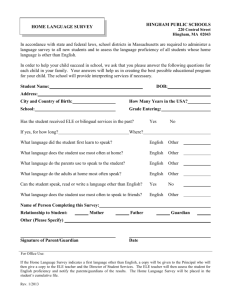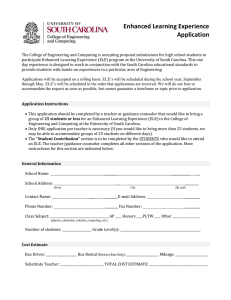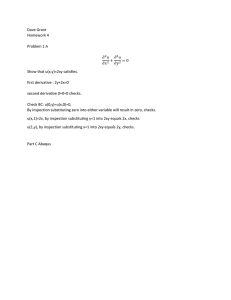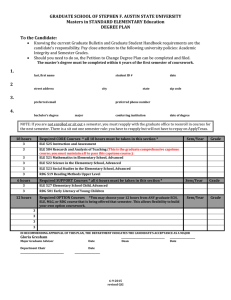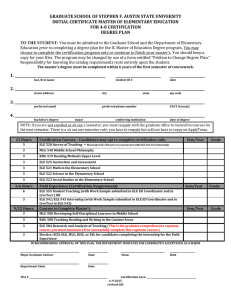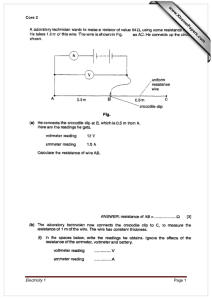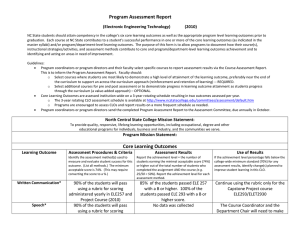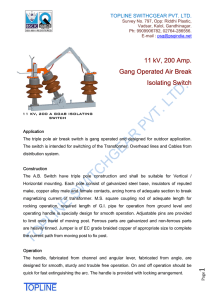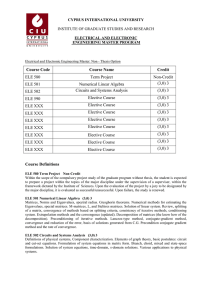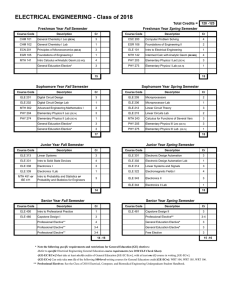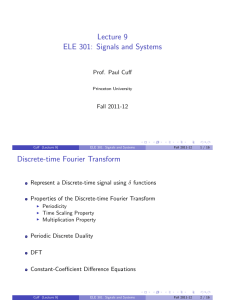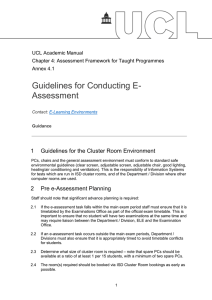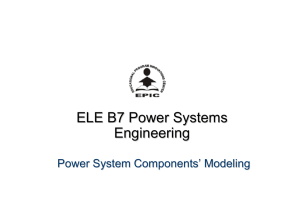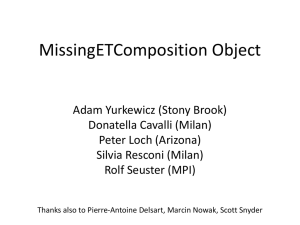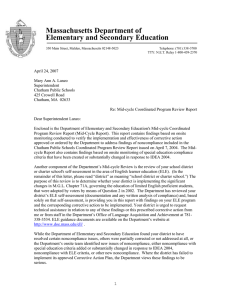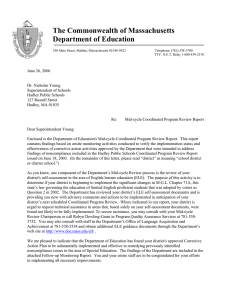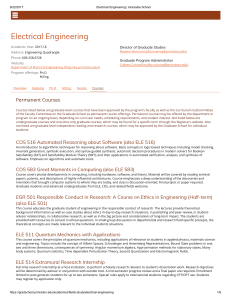course outcomes specific to ele 3280
advertisement
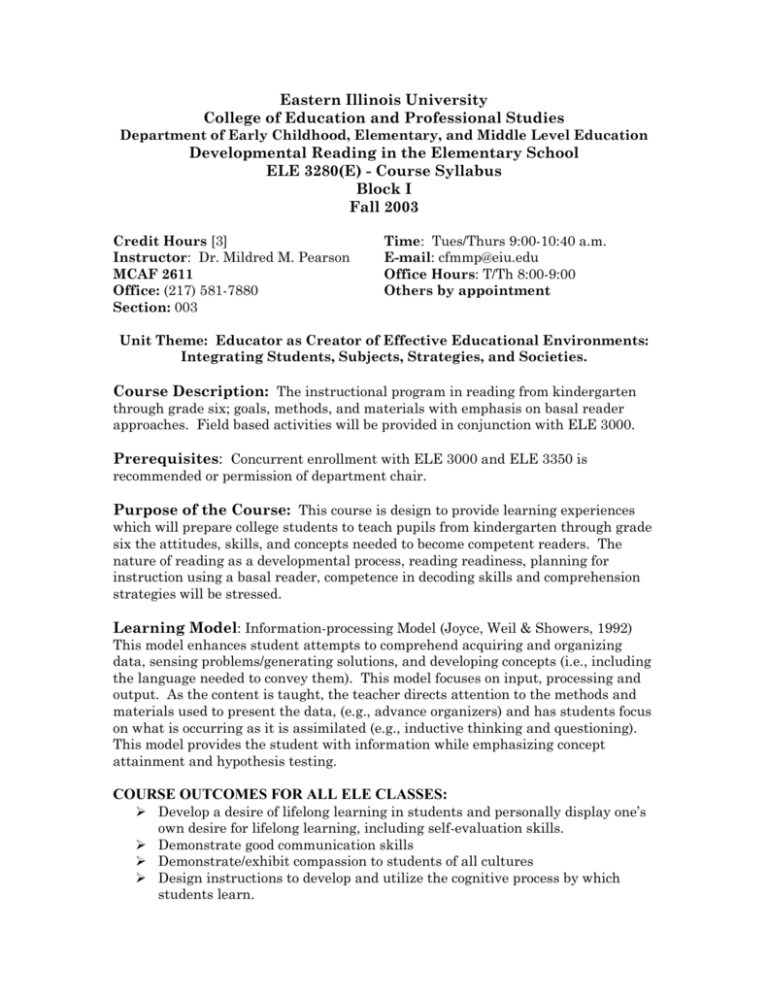
Eastern Illinois University College of Education and Professional Studies Department of Early Childhood, Elementary, and Middle Level Education Developmental Reading in the Elementary School ELE 3280(E) - Course Syllabus Block I Fall 2003 Credit Hours [3] Instructor: Dr. Mildred M. Pearson MCAF 2611 Office: (217) 581-7880 Section: 003 Time: Tues/Thurs 9:00-10:40 a.m. E-mail: cfmmp@eiu.edu Office Hours: T/Th 8:00-9:00 Others by appointment Unit Theme: Educator as Creator of Effective Educational Environments: Integrating Students, Subjects, Strategies, and Societies. Course Description: The instructional program in reading from kindergarten through grade six; goals, methods, and materials with emphasis on basal reader approaches. Field based activities will be provided in conjunction with ELE 3000. Prerequisites: Concurrent enrollment with ELE 3000 and ELE 3350 is recommended or permission of department chair. Purpose of the Course: This course is design to provide learning experiences which will prepare college students to teach pupils from kindergarten through grade six the attitudes, skills, and concepts needed to become competent readers. The nature of reading as a developmental process, reading readiness, planning for instruction using a basal reader, competence in decoding skills and comprehension strategies will be stressed. Learning Model: Information-processing Model (Joyce, Weil & Showers, 1992) This model enhances student attempts to comprehend acquiring and organizing data, sensing problems/generating solutions, and developing concepts (i.e., including the language needed to convey them). This model focuses on input, processing and output. As the content is taught, the teacher directs attention to the methods and materials used to present the data, (e.g., advance organizers) and has students focus on what is occurring as it is assimilated (e.g., inductive thinking and questioning). This model provides the student with information while emphasizing concept attainment and hypothesis testing. COURSE OUTCOMES FOR ALL ELE CLASSES: Develop a desire of lifelong learning in students and personally display one’s own desire for lifelong learning, including self-evaluation skills. Demonstrate good communication skills Demonstrate/exhibit compassion to students of all cultures Design instructions to develop and utilize the cognitive process by which students learn. Demonstrate knowledge of children’s language acquisition. Describe the factors which influence the development of language. Demonstrate knowledge of facts and an understanding of fundamental principles, ideas and relationship among various knowledge domains. Demonstrate knowledge of past and present developments, issues, research, and social influences in the field of education Describe cultural influences which are reflected in the history of the English language Demonstrate knowledge of current issues in the language arts domain. COURSE OUTCOMES SPECIFIC TO ELE 3280: Understand reading skill acquisition and development. Develop knowledge of basic diagnostic techniques for assessing reading levels. Design instruction to develop and utilize cognitive and affective processes by which pupils learn to read. Design instructional methods that reach children with unique learning styles, special needs, various multiple intelligences, different cultural backgrounds, and students identified as “struggling readers.” Demonstrate instruction that encourages children to become life-long readers. Decide what will be learned, activities to promote learning methodologies in order to effectively assess learning. ADDITIONAL INFORMATION: Text: Reutzel, D.R. & Cooter, R.B. (2000). Teaching children to read (3rd ed). New York: Merrill Publishing Company Supplemental reading will be available throughout the semester. COURSE REQUIREMENTS/EVALUATION: 1. Attendance and Active Participation: Students are expected to attend and fully participate in all scheduled classes. If it is necessary to miss a class, please inform the instructor about your absence before the scheduled class meets. More than two missed classes or failure to participate in any in-class activities may result in reduction in total points. Due dates will be set for all work, and grades on all assignments will be lowered five points per day after the due date (25 points) 2. Literature File//On-line Eric Searches: Ten reviews of children’s books for appropriate grade levels should be submitted electronically using APA manuscript style. A template will be provided using Adobe Reader. Proper format with a summary, and at least three related activities will be required. (30 points) 3. Textbook Basal Review: A written review of a basal series (60 points) 4. Reading Across The Curriculum: Research on an integrated reading approach using technology (Internet or published software and the creation of an original model. Read (3) books whereby reading across the curriculum is exemplified. Write a two page synopsis & explaining the books you chose and why. Explain how you would use the chosen book to connect with students. (30 points). 5. Children’s Author/PowerPoint presentation: A written report with class presentation on a noted children’s author (35 points). 6. Directed Reading Activity: Creative presentation, exhibiting a clear purpose following all criteria of DRA (20 points). 7. Examinations: Two major tests consisting primarily of objective items and short answer questions will be administered to assess students understanding of course content. One test will be scheduled during the semester as a mid-term and the other a final exam. Both will be given according to the university’s calendar and schedule. (300 points). Academic Misconduct The University has a responsibility to promote academic honesty and integrity and to develop procedures to deal effectively with instance of academic dishonesty. Students are responsible for the honest completion and representation of their work, for the appropriate citation of sources, and for the respect of others’ academic endeavors. Standard I. Eastern students observe the highest principles of academic integrity and support a campus environment conducive to scholarship. Violations of this standard: a. Conduct in subversion of academic standards, such as cheating on examinations, plagiarism, collusion, misrepresentation of falsification of data. b. Theft or the unauthorized possess of examinations; alteration, theft, or destruction of the academic work of others, or academic records, library materials, laboratory materials, or other University equipment or property related to instructional matters or research. c. Submitting work previously presented in another course unless specifically permitted by instructor. d. Conduct which disrupts the academic environment; disruption in classes, faculty offices, academic buildings, or computers facilities. e. Complicity with others in violations of this standard. Grade Appeal Procedures A student may appeal a grade on the ground that it based a capricious or arbitrary decision of the course instructor. Such an appeal shall follow the established procedures adopted by the department, college, or school in which the course resides. These procedures are available in writing from the respective chairperson or the Academic Dean of the College/School. Sexual Harassment Sexual harassment is reprehensible and will not be tolerated by the University. It threatens the careers, educational experience, and well being of students, faculty, and staff. The University will not tolerate behavior between or among members of the University community which creates an unacceptable working environment. Incompletes A notation of an “incomplete” may be given in lieu of a final grade to a student who has carried out a subject successfully until the end of a semester but who, because of illness or other unusual and substantiated cause beyond the student’s control, has been unable to take or complete the final examination or to complete some limited amount of term work. An incomplete is not given unless you prove to the instructor that you were prevented from completing course requirements for just cause as indicated above. Instructional Activities: Classes will be held in a seminar format with the text providing background information and the instructor asking leading questions. Students are to come to class with discussion questions and be prepared to share insights into the texts. Participation is an important part of this course. Students will be expected to take part in all class discussions; reflect understandings from readings; receive alternative perspectives in a constructive, professional, and respectful manner; listen well to the comments of others; share and negotiate meaning; ask questions for understanding; and contribute to the growth of others. Grading: All students are expected to complete reading and assignments in a timely fashion so that they can participate in class discussions and experiences. Assignments are judged on the quantity of content, presentation (clearly written with no mechanical errors), organization, and use of references using APA manuscript style to support ideas. Students are expected to turn in only original work. Any work that is derived from published sources must include appropriate credit citations. A total of 500 points is possible for the course. The following grading scale will be employed. GRADES 500-460=A (92%-100%) 459-425=B (85-91%) 424-360-=C (72-81%) 359-310=D (62-71%) 309 and below F (61%and below)
